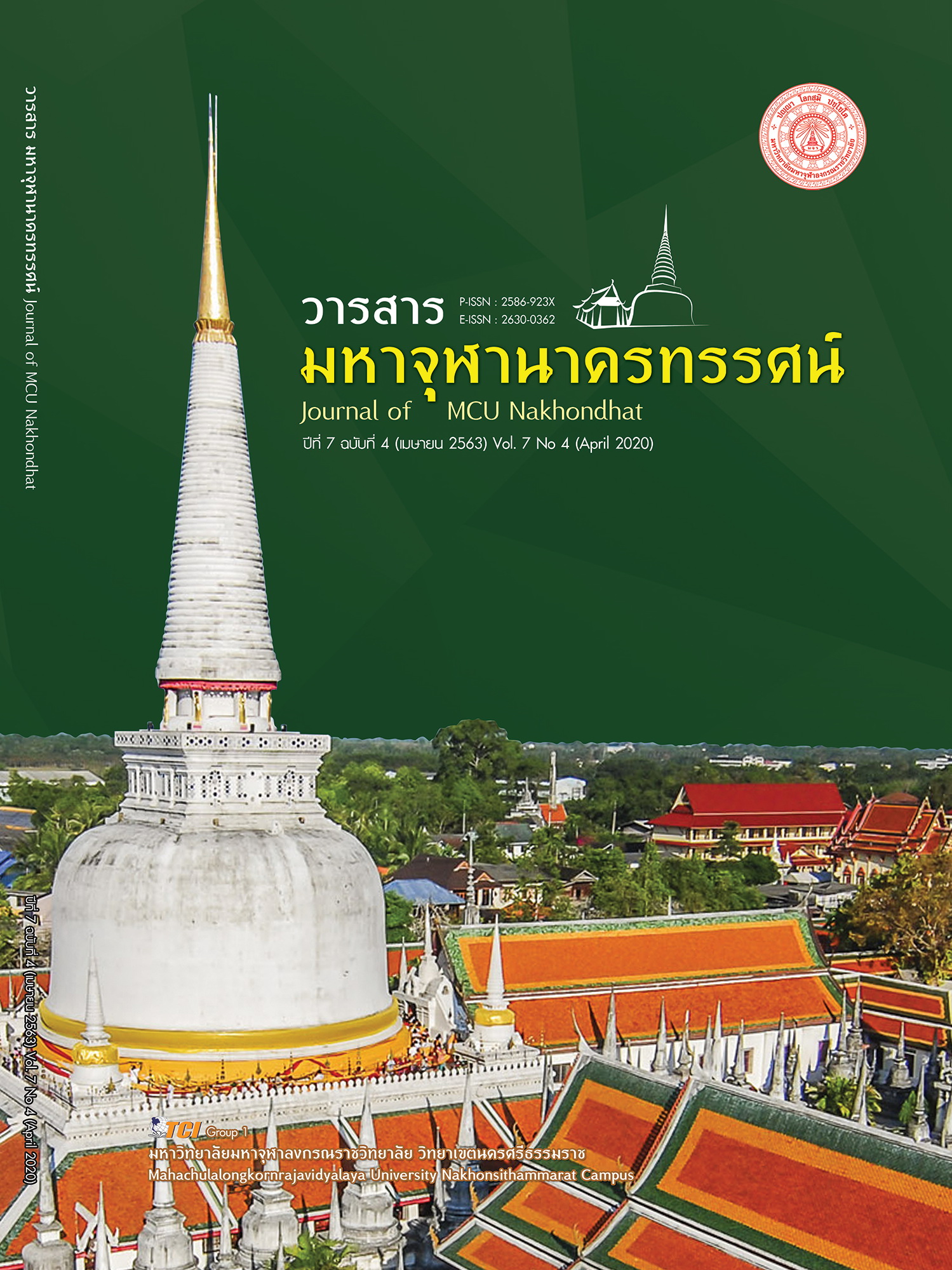AN ANALYTICAL STUDY OF THE LEADERSHIP: A CASE STUDY OF SOMDEJ PHRA BUDDACARYA (KIEAW UPASENO) IN THAI SANGHA ADMINISTRATION
Main Article Content
Abstract
The objectives of this research were as follows: 1) to study the leadership based on the concept of Western theory and the leadership according to Dhamma principle appeared in Tipitaka, 2) to study the leadership of Somdej Phr Buddacary (Kieaw Upaseno) in Thai Sangha administration, and 3) to process for leadership of Somdej Phr Buddacary (Kieaw Upaseno) in Thai Sangha administration. This research is qualitative research, the instrument used for data collection was in-depth interview from 10 key informants.
The results have shown that; 1) The leadership based on the concept of Western theory and the leadership according to Dhamma principle appeared in Tipitaka were found that in behavioral property, ability to influence others that can induce others or other groups were willingness and enthusiasm about doing things according to need for success. For the leadership according to Dhamma principle appeared in Tipitaka was Chakkhumã that was meant to be visionary, Vidhũro that was meant to be management and Nissayasampanno that was meant to be human relationship. 2) The leadership of Somdej Phra Buddhacarya (Kiew Upaseno) in Thai Sangha Administration was found that Somdej Phra Buddhacarya (Kiew Upaseno) had the leadership property that can be divided into 9 aspects including, 2.1) having vision, 2.2) smiling and greeting 2.3) patience, 2.4) fast to work, fast decision-making, 2.5) high standards of work, 2.6) gratitude, 2.7) humility, 2.8) good memory, and 2.9) bravery. 3) The leadership application of Somdej Phra Buddhacarya (Kiew Upaseno) in Thai Sangha Administration was the leadership of Somdej Phra Buddhacarya (Kiew Upaseno) that can be processed in Thai Sangha administration in 6 aspects, including 3.1) the governance should be in the form of creating a vision far and wide, without the power of one person, but to decentralize the oversight of oversight. 3.2) The religious education must be promoted and supported the monks and novices that live in affiliation, they had been educated in PhraPariyattidhamma and other educations that should be consistent with the assigned by Sangha Supreme Council of Thailand. 3.3) The education should promote the monks or the abbots to educational financing. 3.4) The Propagation must develop the potential of personnel who practice about the propagation and should proceed in the propagation along the traditions of the Buddhist monks and Thai tradition with the cooperation of the Buddhist monks, the government and the people. 3.5) The public assistance has to promote the abbot to preserve the historic site and develop a clean surrounding. The temple must be central to community development. The temple had to lay the role of the community or society at which the temple is located. And to make the community or society using the temple as a base for propagating the teaching of Buddhism. 6) The public welfare must have a policy to promote the public interest in order to help the people, the monks and the novices who were still suffering. And the monks have to help them to their own full capacity.
Article Details
References
กวี วงศ์พุฒ. (2545). ภาวะผู้นำ. (พิมพ์ครั้งที่ 4). กรุงเทพมหานคร: ศูนย์ส่งเสริมวิชาชีพ การบัญชี.
กิติ ตยัคคานนท์. (2543). เทคนิคการสร้างภาวะผู้นำ. (พิมพ์ครั้งที่ 10). กรุงเทพมหานคร: เปลวอักษร.
นพรัตน์ พัฒนธัญญา. (2551). การศึกษาวิเคราะห์การพัฒนาบุคคลเพื่อความเป็นผู้นำตามหลักพระพุทธศาสนา. ใน วิทยานิพนธ์พุทธศาสตรมหาบัณฑิต สาขาวิชารัฐประศาสนศาสตร์. มหาจุฬาลงกรณราชวิทยาลัย.
บุญศรี พานะจิตต์. (2545). ความสำเร็จในการปฏิบัติภารกิจของวัด: ศึกษาเฉพาะกรณี วัดสวนแก้ว อำเภอบางใหญ่ จังหวัดนนทบุรี. กรุงเทพมหานคร: สำนักงานคณะกรรมการการศึกษาแห่งชาติ.
พรทิพย์ อัยยิมาพันธ์. (2547). Leadership for Organizational Effectiveness. วารสาร การบริหารคน, 3(24), 65-68.
พระเทพปริยัติสุธี (วรวิทย์ คงฺคปญฺโญ). (2540). เอกสารประกอบคำบรรยาย เรื่อง การคณะสงฆ์และการพระศาสนา. กรุงเทพมหานคร: โรงพิมพ์มหาจุฬาลงกรณราชวิทยาลัย.
พระเมธีธรรมาภรณ์ (ประยูร ธมฺมจิตฺโต). (2538). จุดเปลี่ยนแห่งชีวิต (มองสังคมไทย). กรุงเทพมหานคร: ธรรมสภา.
พระถนัด วฑฺฒโน (บุตรสวัสดิ์). (2551). การวิเคราะห์คุณสมบัติของผู้นําตามหลัก สัปปุริสธรรม 7. ใน วิทยานิพนธ์พุทธศาสตรมหาบัณฑิต สาขารัฐประศาสนศาสตร์. มหาจุฬาลงกรณราชวิทยาลัย.
พระธรรมปิฎก (ป.อ.ปยุตโต). (2542). วินัยเรื่องใหญ่กว่าที่คิด. กรุงเทพมหานคร: โรงพิมพ์มหาจุฬาลงกรณราชวิทยาลัย.
พระบัณฑิต ญาณธีโร (สุธีระตฤษณา). (2552). ภาวะผู้นำของพระธรรมโกศาจารย์ (ประยูร ธมฺมจิตฺโต) ในการบริหารกิจการคณะสงฆ์. ใน วิทยานิพนธ์พุทธศาสตรมหาบัณฑิต สาขาวิชารัฐประศาสนศาสตร์. มหาจุฬาลงกรณราชวิทยาลัย.
พระมหาธรรมรัต อริยธัมโม. (2543). การศึกษาวิเคราะห์หลักรัฐศาสตร์ที่มีในพระไตรปิฎก. กรุงเทพมหานคร: ห้างหุ้นส่วนกำจัดโรงพิมพ์สุรวัฒน์.
พระมหาวินัย ปุญฺญาโณ. (2542). พระพุทธศาสนากับการเปลี่ยนแปลงในอดีตและปัจจุบัน. พุทธจักร, 53(5), 40-47.
พระมหาสุริยา ฐิตเมธี (รักษาเมือง). (2552). ภาวะผู้นำในการบริหารกิจการคณะสงฆ์: ศึกษากรณีเฉพาะพระราชนันทมุนี (สำรวย อาภากโร). ใน วิทยานิพนธ์พุทธศาสตรมหาบัณฑิต สาขาวิชารัฐประศาสนศาสตร์. มหาจุฬาลงกรณราชวิทยาลัย.
พระราชวรมุนี (ป.อ.ปยุตโต). (2529). สถาบันสงฆ์กับสังคมไทย. กรุงเทพมหานคร: จรูญการพิมพ์.
มหาจุฬาลงกรณราชวิทยาลัย. (2535). พระไตรปิฎกภาษาไทย ฉบับมหาจุฬาลงกรณราชวิทยาลัย. กรุงเทพมหานคร: โรงพิมพ์มหาจุฬาลงกรณราชวิทยาลัย.
สง่า หล่อสำราญ. (2541). ตำนานพุทธสาวก. กรุงเทพมหานคร: อักษรสยามการพิมพ์.
สุพานี สฤษฎ์วานิช. (2549). พฤติกรรมองค์การสมัยใหม่: แนวคิดและทฤษฎี. กรุงเทพมหานคร: โรงพิมพ์มหาวิทยาลัยธรรมศาสตร์.
สุวิน สุขสมกิจ. (2523). พุทธปรัชญากับการสร้างเสริมภาวะผู้นํา: กรณีศึกษากํานันผู้ใหญ่บ้านจังหวัดกาญจนบุรี. ใน วิทยานิพนธ์รัฐศาสตรมหาบัณฑิต สาขาวิชาการปกครอง. จุฬาลงกรณ์มหาวิทยาลัย.


